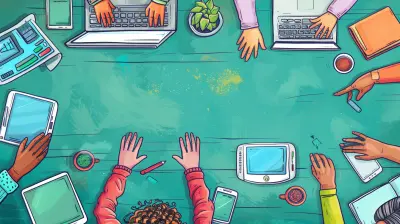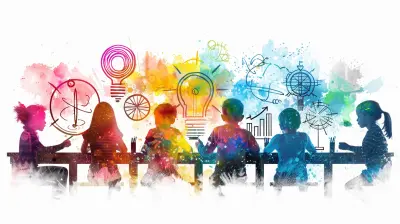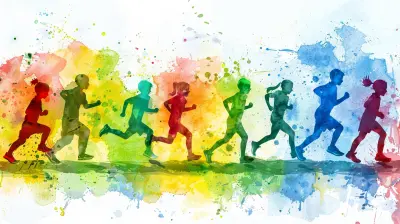19 March 2025
In today’s fast-paced, tech-driven world, digital literacy is no longer optional—it’s essential. Think about it: when was the last time you went an entire day without using some form of digital technology? Whether it’s checking your email, navigating through Google Maps, or scrolling through social media, our lives are intertwined with the digital landscape. But it's not just about knowing how to use technology; it’s about understanding it, leveraging it effectively, and being aware of its implications.
Digital literacy doesn't just affect one aspect of life—it touches everything. From education to employment, from personal life to social interactions, being digitally literate is like having a key that unlocks endless possibilities. But what exactly is digital literacy? And why is it so important in the modern world? Let’s dive in.

What Is Digital Literacy?
Before we go any further, let’s clarify what we mean by "digital literacy."At its core, digital literacy refers to the ability to find, evaluate, communicate, and create information using digital technologies. It’s about more than just proficiency with a computer or a smartphone. Sure, knowing how to use a device matters, but digital literacy stretches further. It includes understanding online privacy, discerning credible sources from fake news, engaging responsibly on social media, and even knowing how to troubleshoot basic tech issues.
The Key Components of Digital Literacy:
1. Technical Proficiency: Can you navigate different devices and software programs with ease?2. Information Literacy: Do you know how to search for information effectively and assess its credibility?
3. Communication Skills: Are you able to communicate clearly and professionally in a digital space, whether via email, social media, or collaboration tools?
4. Digital Etiquette: Do you understand the unwritten rules of online interactions, such as how to avoid trolling or cyberbullying?
5. Critical Thinking: Can you assess the reliability of information, identify biases, and make informed decisions?
In essence, digital literacy is like a toolbox. The more tools you have, the more empowered you are to thrive in the modern world.

Why Is Digital Literacy So Important?
Now that we’ve covered what digital literacy is, let’s talk about why it matters so much. From education and employment to personal development, digital literacy plays a vital role in virtually every aspect of our lives.1. Education in the Digital Age
Remember the days when learning was limited to textbooks and chalkboards? Those days are long gone. Nowadays, education is increasingly digital. From online courses to virtual classrooms, students need to be digitally literate to succeed.Even outside of school, the ability to learn independently online is a crucial skill. Whether it’s watching a YouTube tutorial, enrolling in an online course, or accessing academic journals, the internet is a treasure trove of knowledge—if you know how to use it.
For educators, digital literacy is equally important. Teachers need to know how to engage students through online platforms, deliver content effectively, and evaluate digital resources. It’s a two-way street: both students and teachers need to be on the same page when it comes to navigating the digital world.
2. Employment and Career Development
Digital literacy isn’t just a "nice-to-have" skill in the job market—it’s essential. In today’s workforce, virtually every job requires some level of digital proficiency. Whether you’re working in an office, managing a social media account, or even running a small business, you’ll need digital skills to stay competitive.Consider this: many job applications today are entirely digital. From creating a LinkedIn profile to submitting an online application, if you’re not digitally literate, you’re already at a disadvantage. And it doesn’t stop there—once you land the job, digital literacy will help you navigate workplace tools like Slack, Zoom, Google Workspace, and others.
But it’s not just about landing a job. Continuous learning and upskilling are crucial in today’s dynamic job market. Digital literacy enables professionals to take online courses, attend webinars, and participate in digital conferences, ensuring they stay ahead in their careers.
3. Social Connectivity
Let’s face it: we live in the age of social media. Whether we like it or not, platforms like Facebook, Instagram, and Twitter are part of our daily lives. Digital literacy helps us navigate these platforms responsibly. It’s not just about sharing memes or liking photos; it’s about engaging in meaningful conversations, understanding the impact of what we post, and staying safe.For example, digital literacy helps people recognize phishing scams or malicious links that could compromise personal data. It also teaches us the importance of privacy settings and how to control who sees our personal information. In a world where cyber threats are on the rise, understanding these aspects is crucial.
Moreover, digital literacy enhances our ability to communicate effectively online. We’ve all seen it—miscommunications that lead to heated arguments, or worse, cyberbullying. Being digitally literate means knowing how to express yourself clearly, respectfully, and responsibly on digital platforms.
4. Critical Thinking and Information Evaluation
One of the most underrated aspects of digital literacy is its role in fostering critical thinking. The internet is full of information, but not all of it is reliable. In fact, fake news and misinformation have become major problems.Digital literacy teaches us how to critically evaluate information. It’s about asking questions like: Is this source credible? What’s the author's agenda? Is this news story backed by evidence? In an age where misinformation spreads faster than facts, being able to discern the truth is an invaluable skill.
5. Empowerment and Independence
Digital literacy isn’t just about survival—it’s about empowerment. When you’re digitally literate, you have the power to access information, connect with others, and even create your own digital content. You’re not just a passive consumer; you’re an active participant in the digital world.Let’s say you want to start a blog, launch an online store, or create a YouTube channel. Digital literacy gives you the skills to make that happen. It opens doors to new opportunities, allowing you to express yourself, share your ideas, and even build a personal brand.
In other words, digital literacy puts you in the driver’s seat.

The Challenges of Digital Literacy
While the importance of digital literacy is clear, there are challenges that come with it.1. The Digital Divide
Not everyone has equal access to technology or the internet. This is known as the "digital divide." People in rural areas, low-income households, or developing countries often lack the resources they need to become digitally literate. This creates a gap between those who are equipped for the digital world and those who are not.Addressing this issue requires a collective effort—from governments to tech companies, schools to non-profits—to ensure that everyone has access to digital tools and education.
2. Technology Fatigue
With the constant influx of new apps, devices, and tools, it’s easy to feel overwhelmed. Some people may struggle to keep up with the latest trends and updates, leading to technology fatigue. This can make digital literacy feel like a moving target.However, the key here is balance. You don’t need to be an expert in every new gadget or app. Focus on building core digital skills that are transferable, and don’t be afraid to set boundaries when it comes to tech use.
3. Cybersecurity and Privacy Concerns
As we become more digitally literate, we also need to be aware of the risks. Cybersecurity threats like hacking, identity theft, and data breaches are on the rise. Digital literacy isn’t just about knowing how to use technology; it’s about using it safely. This includes understanding how to protect your personal information, set strong passwords, and recognize phishing attempts.
How to Improve Digital Literacy
So, how can you boost your digital literacy? Here are a few practical steps:1. Take Online Courses: Platforms like Coursera, Udemy, and Khan Academy offer courses on everything from basic computer skills to advanced digital marketing.
2. Practice Makes Perfect: The more you engage with digital tools, the more comfortable you’ll become. Don’t be afraid to experiment with new software, apps, or devices.
3. Stay Updated: Follow tech blogs, listen to podcasts, or watch YouTube channels that cover the latest in digital trends.
4. Ask for Help: If you’re struggling with something, don’t hesitate to ask a friend, family member, or even a tech-savvy colleague for assistance.
5. Be Critical: Always question the information you come across online. Check multiple sources, look for evidence, and be aware of biases.
Conclusion
In the modern world, digital literacy isn’t just a skill—it’s a necessity. Whether you’re a student, a professional, or just someone navigating daily life, being digitally literate opens doors, enhances opportunities, and empowers you to thrive in a connected world. It’s not just about knowing how to use a device; it’s about understanding the broader digital landscape and engaging with it responsibly.So, if you haven’t already, now is the perfect time to sharpen your digital literacy skills. The world is only going to get more digital, and the better equipped you are, the more ready you’ll be to take on whatever comes next.









Melody McCracken
Digital literacy is essential today; it empowers individuals to navigate information, fosters critical thinking, and enhances communication skills, making it a cornerstone for personal and professional growth.
April 2, 2025 at 3:46 AM